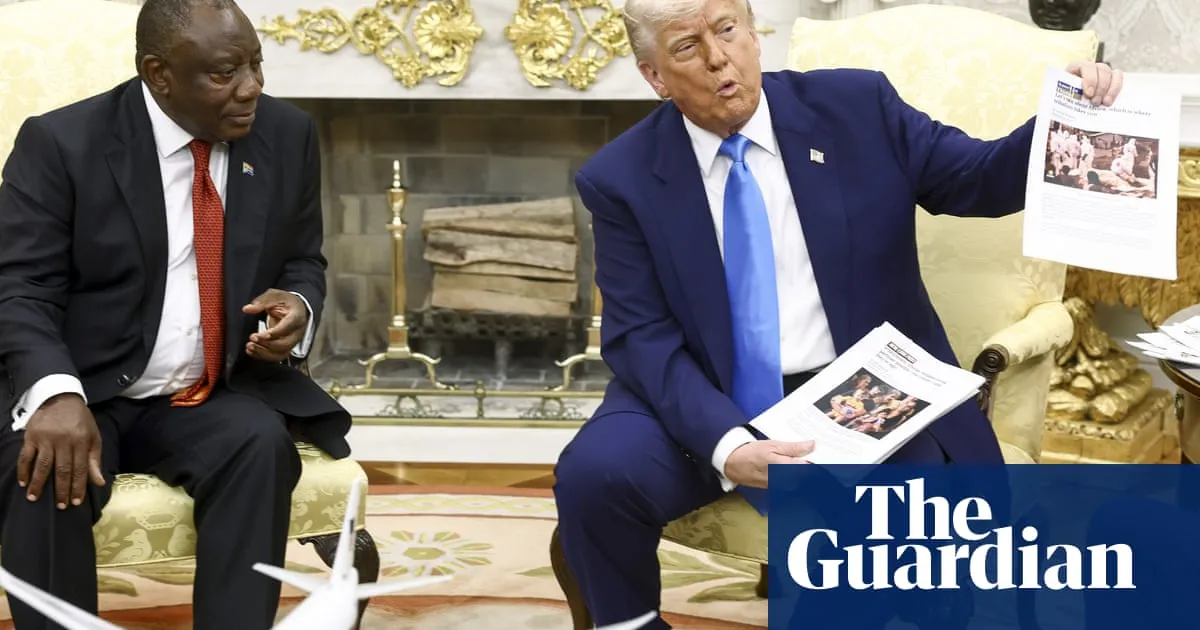
In a dramatic encounter at the White House, former President Donald Trump challenged South African President Cyril Ramaphosa with a video he falsely claimed showed evidence of genocide against white people in South Africa. This controversial meeting, reminiscent of Trump's previous confrontational discussions, marked one of the most tense moments in the Oval Office since his infamous interaction with Volodymyr Zelenskyy in February.
Trump has long argued that Afrikaners, a minority group descended from Dutch colonists, face persecution in South Africa. Despite these claims, the South African government staunchly rejects the notion of genocide, emphasizing that the majority of murder victims in the country are Black. As the meeting began with light-hearted banter about golf, it quickly escalated when Ramaphosa stated that there is no genocide against Afrikaners. Trump reacted by directing his staff to dim the lights and play a video that he believed would support his assertions.
The video featured clips of former South African President Jacob Zuma and opposition politician Julius Malema singing a song associated with the apartheid struggle, which included inflammatory lyrics. Ramaphosa firmly countered Trump’s narrative, clarifying that the views expressed in the video do not reflect official government policy. Trump attempted to bolster his argument by showcasing newspaper articles he claimed highlighted the recent killings of white farmers, repeatedly proclaiming, “Death, death, death, horrible death.”
Throughout the discussion, Trump maintained a focus on the theme of white genocide, a conspiracy theory popularized by the far right and figures like Elon Musk and Tucker Carlson. He stated, “What’s happening now is never reported. Nobody knows about it.” In contrast, Ramaphosa adhered to a calm demeanor, recalling teachings from Nelson Mandela that emphasize dialogue in addressing societal issues. He insisted that the two leaders should engage in constructive discussions rather than sensationalizing the situation.
The meeting occurred amid deteriorating relations between the United States and South Africa, the lowest since the end of apartheid in 1994. Recent actions by the US government, including condemning South Africa's stance on Israel and implementing tariffs, have further strained diplomatic ties. A significant point of contention remains the South African land-expropriation law aimed at correcting historical injustices related to white minority rule. Ramaphosa has assured that this law will not lead to arbitrary land seizures, emphasizing constitutional protections for all South Africans.
Accompanying Ramaphosa at the meeting were influential figures such as South Africa's Agriculture Minister John Steenhuisen and prominent business leaders like Johann Rupert. Rupert highlighted the urgent need for technological assistance to combat crime in South Africa, stressing that the violence affects all communities, not just white farmers. He proposed the implementation of Starlink satellite internet services and drone technology to enhance local police capabilities.
As South Africa grapples with significant socioeconomic inequalities, the discussion between Trump and Ramaphosa underscores the complexities of race relations and land ownership in the country. With white individuals constituting only 7% of the population yet owning a substantial portion of the land, addressing these disparities remains a critical challenge for both South African leadership and international observers.